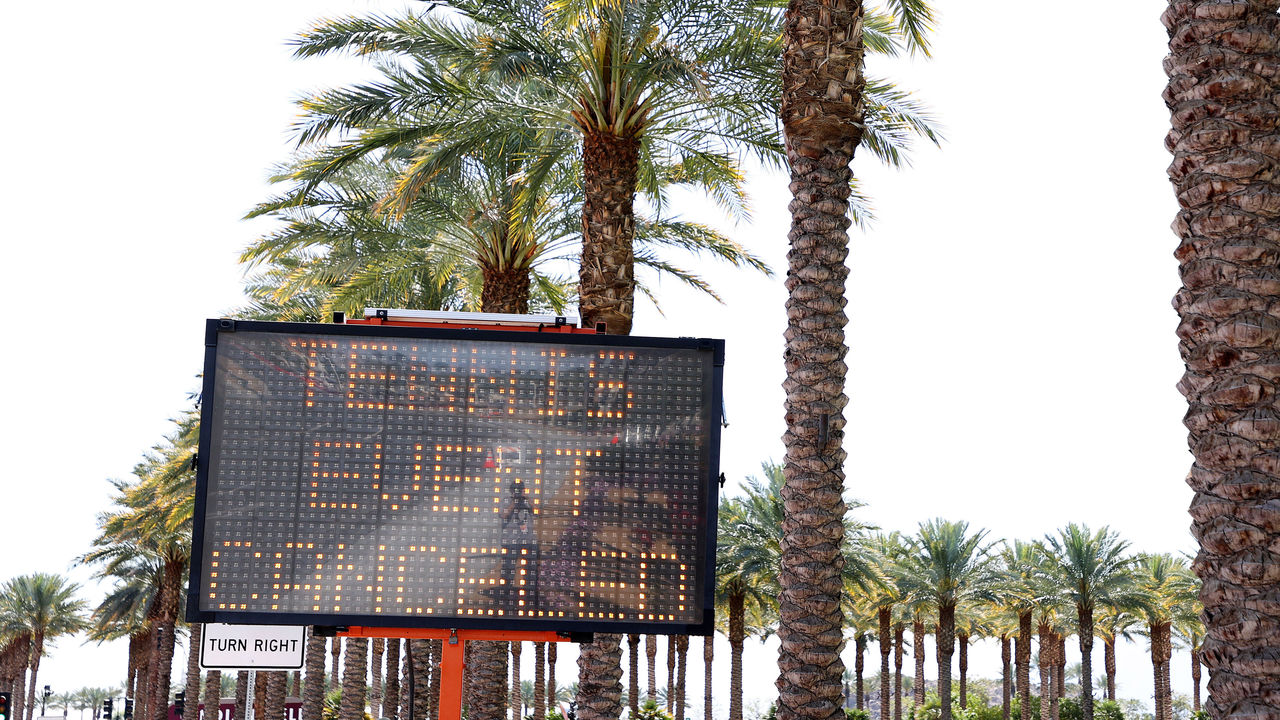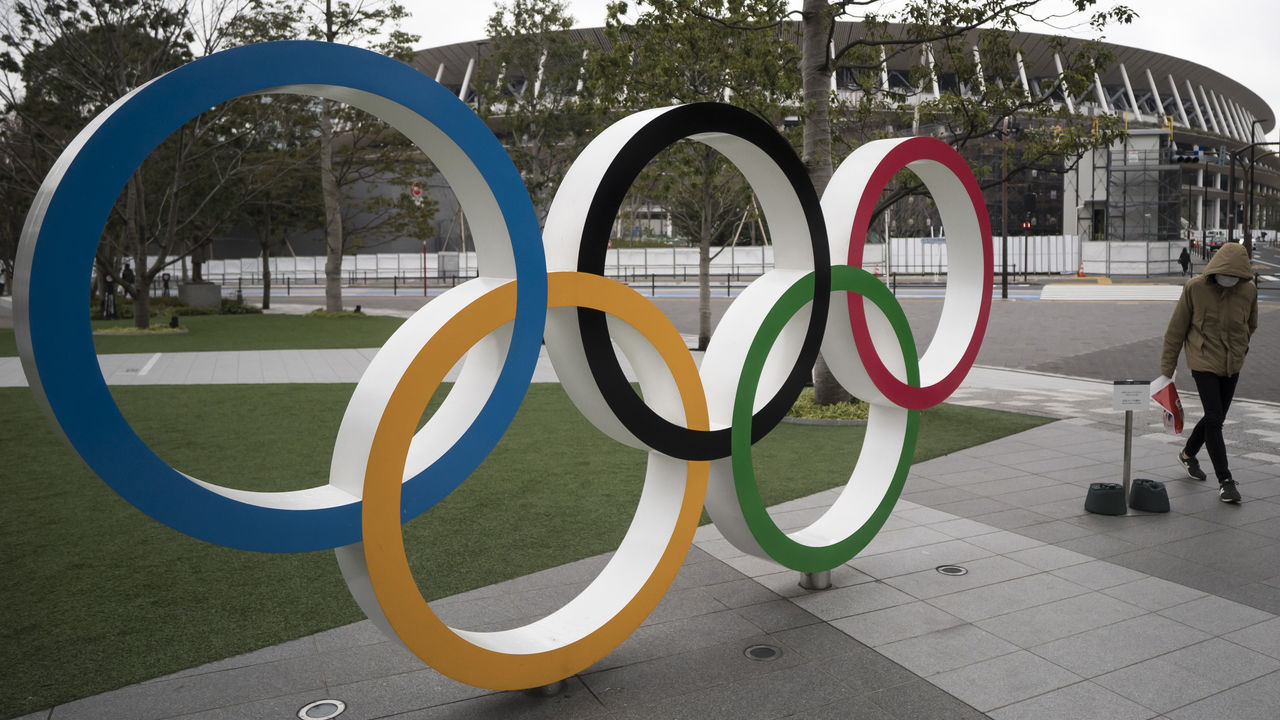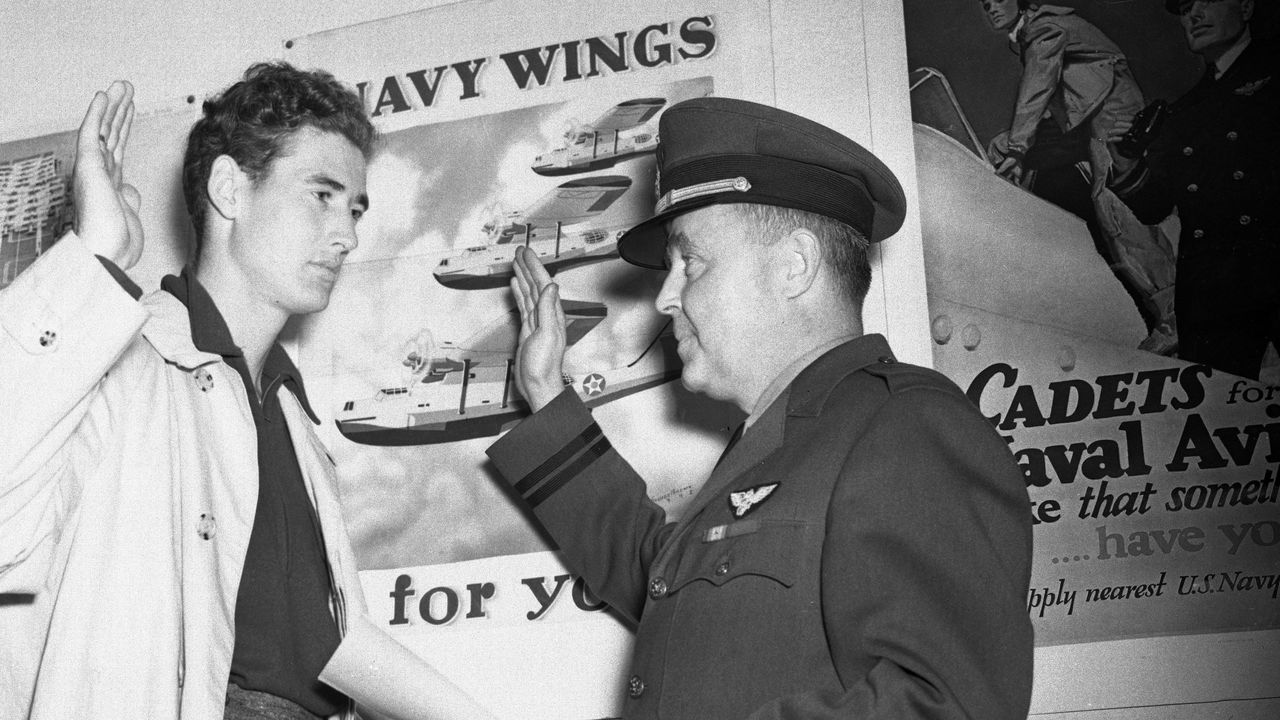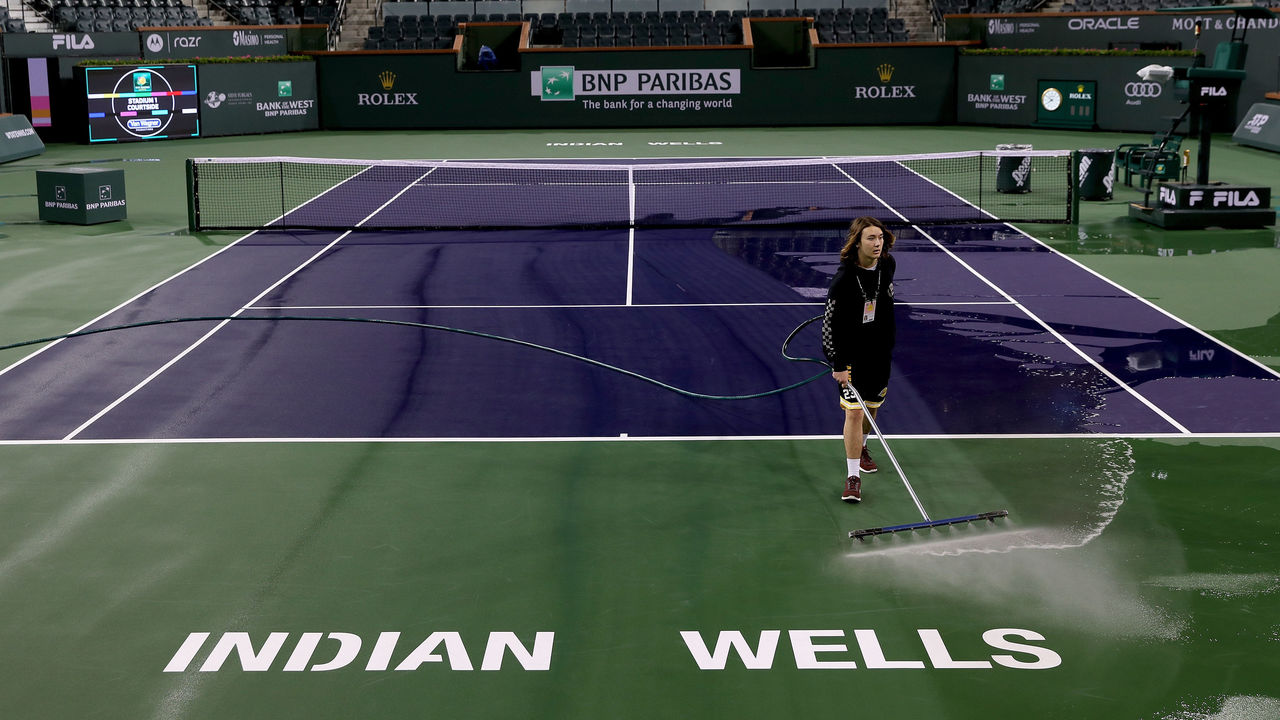Why no crisis has ever affected sports like the coronavirus
The women's world hockey championship in Nova Scotia has been postponed until next year. Tennis' prestigious Indian Wells event in California was scrapped on the eve of the tournament. Japanese baseball's Opening Day is delayed indefinitely. Marquee soccer matches across Europe are scheduled to be played in empty stadiums. In Italy, they've been canceled outright for at least the rest of March.
Over the past several days - as confirmed cases of COVID-19 exceeded 100,000 around the world - sports leagues and organizations have taken increasingly severe precautions to avoid intensifying the spread of the disease. Along with the examples above, no fans were present for Division III basketball tournament games in Baltimore last weekend and no spectators will attend the Olympic torch-lighting ceremony in Greece on Thursday. Pro soccer is on hold in Switzerland, South Korea, Japan, and China - close to the nexus of the outbreak and far beyond. The breadth of this response is unprecedented in history.
For the time being, numerous major events are still set to proceed as usual, from March Madness and the Masters over the next 30 days to Euro 2020 and the Tokyo Olympics this summer. The NBA, NHL, and MLB schedules are similarly untouched, but that may change as each league's defensive strategy evolves.
If any of these competitions are played in isolation or abandoned altogether, it will be further evidence that no crisis event has ever affected sports to this degree: not the influenza outbreak of a century ago, either world war, or any virus of recent origin.
"With how rapidly this infectious disease has spread globally to so many countries, it's just having such a greater impact than we've ever seen on sport before," U.K.-based sports historian Heather Dichter said.

Dichter is an associate professor of sport management at De Montfort University in Leicester, England, where she focuses her research on mega-events and international competition. In a conversation that's been condensed and edited for clarity, she spoke to theScore on Monday about the uptick in worldwide cancellations, the uniqueness of this ongoing mass response, and the ways in which our games could potentially change as a result.
theScore: All sorts of major events across the world are being canceled or played without fans in attendance. Does this kind of widespread global response in the sports world have any historical equivalent?
Dichter: Not to this global extent. With Ebola in Africa a few years ago, there was definitely an impact there with the Africa Cup of Nations being moved (out of Morocco) and some countries not wanting to have this influx of fans from Ebola-infected West African states. But that was really at a continental level.
I guess the only other, earlier precedent was the FIFA Women's World Cup in 2003, in China with SARS. (That tournament was moved to the U.S., while the women's world hockey championship, set to be held in Beijing, was canceled altogether.) That was still when China was really getting started with hosting international events in the lead-up to the Beijing Olympics. Since Beijing, they've been hosting a lot more international events, which is why the earliest events being canceled or moved were the events in China. As this disease has spread all around the globe, it hasn't been as limited geographically as previously.
I think where we'll see the impact and the change - and it'll be a bit more behind the scenes - there's going to be a lot more elements to public health that cities and governing bodies will take into consideration when it comes to locations bidding for events. Just looking at hockey and Nova Scotia and (the 2020 women's world championship) being postponed a year now, you are dealing with a single sport. You're dealing with one location, or two, and some practice areas. But the scale and scope of bidding for and planning for that event, it's still significant.

S: Lately, in general, it seems as though fewer cities have been bidding for or showing a willingness to host the Olympics. I think it's starting to be seen as somewhat of a burden even when there's no specter of a global disease spreading. This seems to be an additional complication or reason cities might cite in balking at hosting such major events.
D: They're going to have to consider those things. We haven't seen it yet with sport, but if somebody attends an event and we now have this mass spread of the coronavirus, or any future infectious disease, because of the sporting event - if that becomes a place where all of a sudden, thousands of people get infected in a single afternoon or (over) three days of a tournament - then I think you're going to hear even more of a backlash of locations not wanting to potentially host.
It's one thing that world championships for indoor athletics have been postponed a year, and women's ice hockey. Those federations - which are two of the biggest, wealthiest, most prominent international federations - they've said, "We're making our commitment to this location. You have spent the year planning and preparing for this. We're just going to move it a year." But places where events are being canceled, that's lost income, and that's not just for the sport itself. That's all of the elements related to the tourism industry. They may choose not to want to try to host an event again in the future.
S: How did the 1918 influenza pandemic affect the sports world? Do any elements of that response parallel at all what we're seeing today?
D: Sport was so different back then. Yes, we had international sport and global sport, but not to the extent that we do nowadays. If it did have an impact back then, it would have been very localized. The modern Olympics - although they were founded in 1896 - until 1912, they were really small. It wasn't like you were an athlete and you trained to go to the Olympics. 1912 is when we first started to see the Olympics kind of actually looking like modern Olympics, and then they didn't happen in 1916.
You didn't have many world championships back then. It was only a few international sports that did. In 1918, with the war having literally just ended, most of the federations weren't even looking to meet again until 1919. International sport was so disrupted by the war anyway that you didn't see this kind of (additional) impact on sport back then.

S: I'm interested in chatting about the risk-reward proposition that's inherent here. On one hand, there's the entertainment value sports provide in trying times, versus what probably should be the paramount concern: the possibility of people getting infected at events. I realize it's a different scenario, but MLB, minus many players who went off and served, still played during World War II. How have sports organizations weighed this risk-reward equation over the years, and what has it taken for them to cancel events outright?
D: It's a tough one. They all have to weigh whatever is happening in the world against what is needed. Obviously, there was that sense during (both) world wars coming from the White House of, "We need baseball to continue. This helps with morale in the country." But when 9/11 happened, all sports stopped for a week. That's why we now have the Super Bowl in February, because it got pushed back - they lost a week in September that year.
There's a difference between our professional sports, where the goal is to make money, versus sport at other levels, be it high school sport, youth grassroots sport. NCAA sport in the U.S. is, in theory, about social value, but we all know certain sports make a lot of money. The NCAA does not want to (cancel) its March Madness Final Four, because that's a huge cash cow for them, just like the IOC wants the Olympics to happen when they're supposed to happen, because of the sponsorship, the broadcasting rights. NBC has already announced they've made over $1.25 billion for, basically, commercials. They're going to reap in that cash because they've already shelled out billions for the right to broadcast the Olympics.
The badminton federation, they're not bringing in the money like the National Hockey League is. It's just the nature of the sport. Whatever's happening in the world factors differently to what these organizations are making decisions on.

S: Again, with the obvious caveat that keeping people healthy is the most important thing, there's an opportunity cost beyond money to the organizations themselves that athletes incur when events are canceled. Tennis players would lose out on their primary income stream if big events are scrapped. Top women's hockey players won't get to play in their marquee event this year. When events have been canceled in the past, to what degree have these sorts of concerns been considered?
D: It's not necessarily events (being) canceled. Think about Olympic boycotts, where other people are making decisions, not the athletes, as to attend. When it was the very political decision for the U.S. not to go compete in Moscow in 1980, and for other countries that also chose to boycott, those athletes were upset. They felt left out. For sports where the Olympics is the pinnacle - where you don't have an opportunity to be a professional rower, that kind of thing - that was their peak. They trained for that. The Olympics happen once every four years. World championships in the IAAF only happen every two years. To miss that, that might have been their one chance where they actually could have won.
When you think about professional athletes - tennis, absolutely. If tournaments aren't held, they're not going to win that money. Yes, some of them have sponsorship. For the very best ones - Federer, Djokovic, Serena Williams - they make more money on sponsorships than they do winning the tournament. But that's not to say what they're winning in tournaments is paltry. That is still income they've been planning for. For athletes who are lower down in the ranks, getting to the second or third round of a tournament actually does give them money they're desperately in need of to be able to maintain their career as a professional athlete.
S: What other lasting changes in sports might this global response to the coronavirus prompt?
D: I think it's hard to say. I think there will be greater contingency plans put into place. I do think we will start to see greater planning: bringing in more public health officials when it comes to places that are going ahead planning and hosting events.
Unfortunately, we're seeing more of these new infectious diseases. SARS was 17 years ago. Ebola, we saw the big outbreak six years ago. Zika was four years ago. If we're seeing more new infectious diseases, I mean, that's scary from a health standpoint anyways globally. But if we're seeing more - we're having new diseases coming around more frequently - I think that's going to have to be taken into consideration.
It's hard to plan for something that you don't know what it is. It's the same issue with catching athletes who dope. You can't have the detection until you actually know what the new drug is that they're taking. It's hard. Anti-doping is always playing catch-up to science and whoever is doping, and that's kind of, in some ways, how public health is with respect to these sporting events. But you can see what has happened. How can we prepare to prevent something similar?
Nick Faris is a features writer at theScore.
HEADLINES
- Modric strikes late to earn Milan victory at struggling Pisa
- Nations League draw: England gets Spain; Germany, Netherlands renew rivalry
- Latest transfer news and rumors: Lewandowski to assess 5 offers
- Infantino toasts end to Super League plot: 'Football wins when we unite'
- Lazio knock holders Bologna out of Italian Cup in shootout